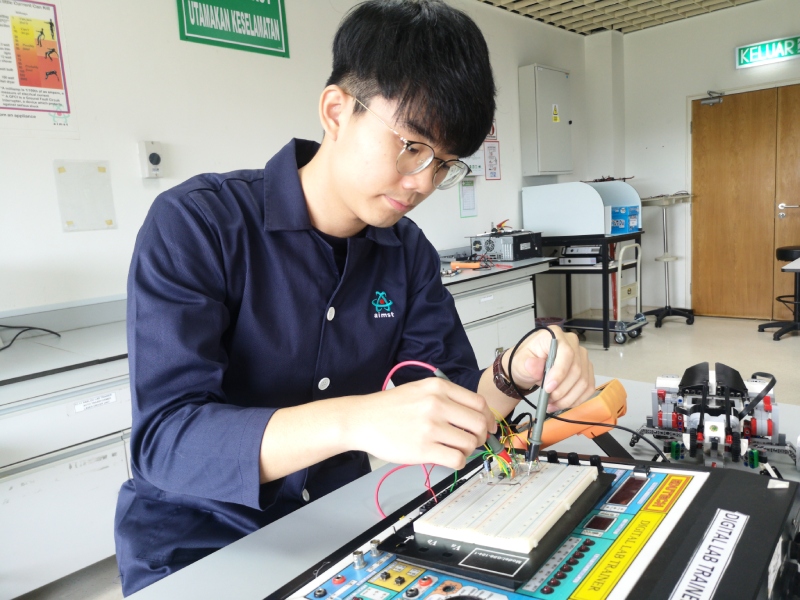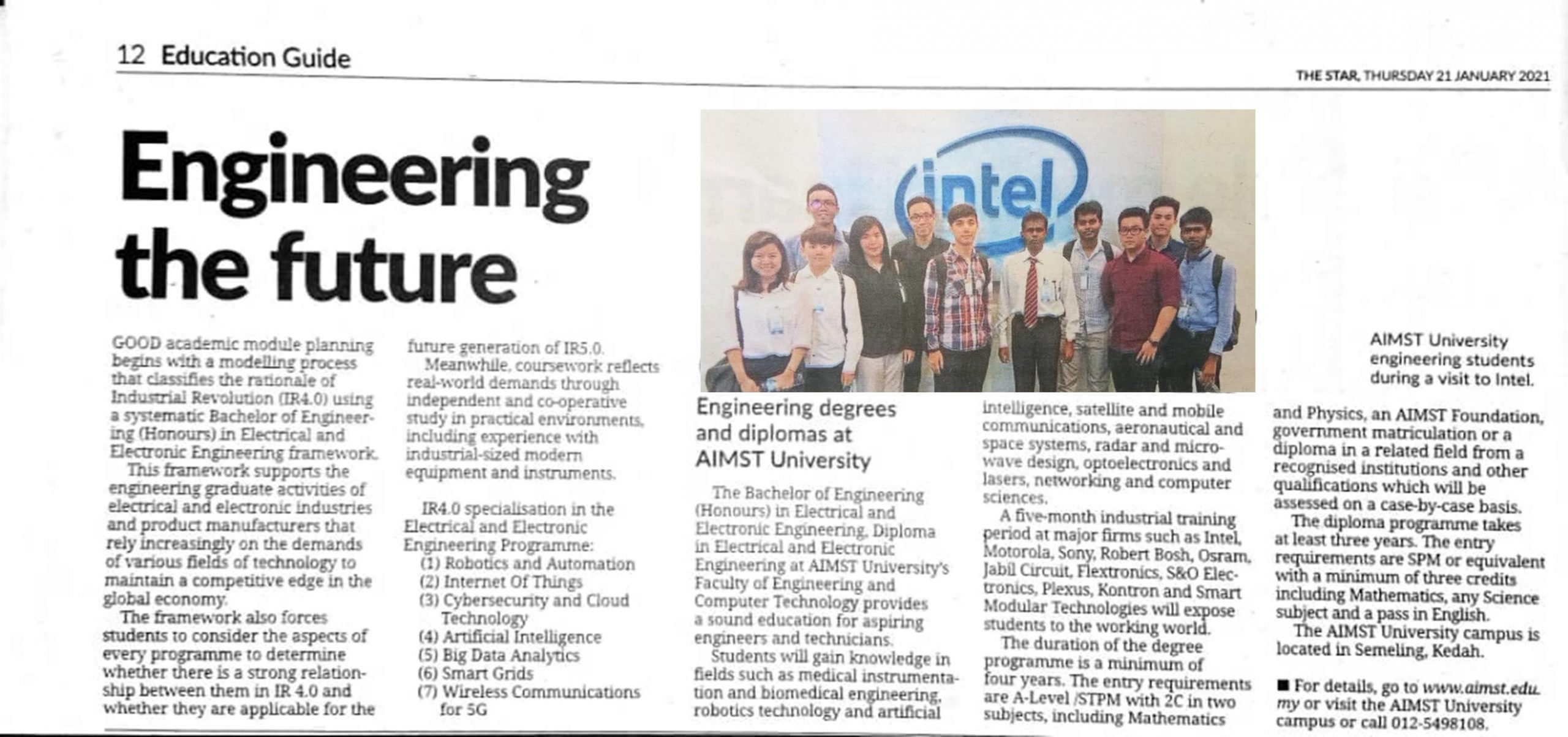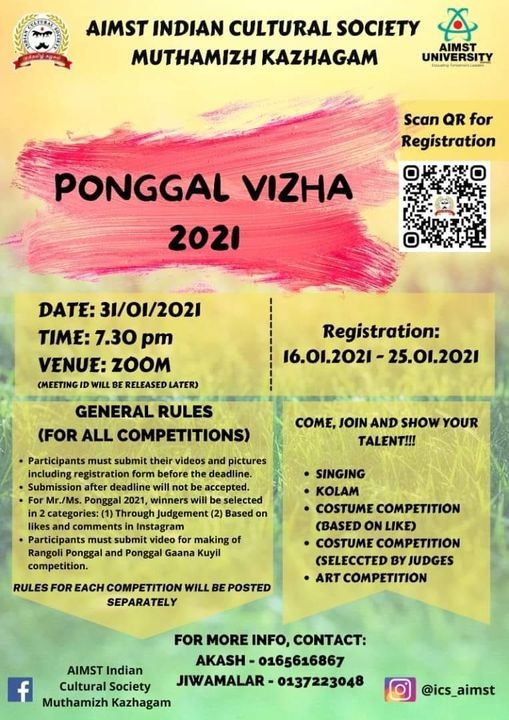GLOBAL CHALLENGE TO ADDRESS PANDEMIC, MUTATIONS
In finding vaccines to combat Covid-19, emerging and re-emerging infections continue to complicate medical scientists. Though it is challenging, the race to find vaccines continues. Despite the development of new diagnostic kits, methods of producing vaccines, and recasting of treatment protocols, a particular health concern termed antimicrobial resistance (AMR) is to be comprehended. Get to know about AMR and how to tackle it through an opinion piece by Professor Dr. P.K. Rajesh, the Deputy Vice-Chancellor for academic and international affairs, AIMST University. The article titled ‘Global challenge to address pandemic, mutations’ was published in the columnist section of the News Straits Times (NST) on 5th February 2021. Click https://www.nst.com.my/opinion/columnists/2021/02/663204/global-challenge-address-pandemic-mutations to read.
MINIMISING THE RISK OF CANCER
 Senior Associate Professor Dr. Subhash Janardhan Bhore from the Faculty of Applied Sciences (FAS) AIMST University has written on World Cancer Day observed on 4th February every year. Dr. Subhash has substantiated his writing with facts about cancer. He has also highlighted the importance of cancer prevention, early detection, and treatment.
The article was published in the ‘Letters to Editor’ column of TheStar on 5th February 2021. Please click https://www.thestar.com.my/opinion/letters/2021/02/05/minimising-the-risk-of-cancer to read.
Senior Associate Professor Dr. Subhash Janardhan Bhore from the Faculty of Applied Sciences (FAS) AIMST University has written on World Cancer Day observed on 4th February every year. Dr. Subhash has substantiated his writing with facts about cancer. He has also highlighted the importance of cancer prevention, early detection, and treatment.
The article was published in the ‘Letters to Editor’ column of TheStar on 5th February 2021. Please click https://www.thestar.com.my/opinion/letters/2021/02/05/minimising-the-risk-of-cancer to read.
MBA vs Master’s Degree: What are the Differences?
Are you thinking about taking an MBA course in Malaysia or Master's and wondering the difference between both degrees? Indeed, graduate studies can be a great way to prepare yourself for a more senior or management position. The first Master's program that comes to mind, speaking of a managerial role, is the Master of Business Administration (MBA)-the most recognisable business degree worldwide. Reaching a top management position does not necessarily imply learning a dedicated management program such as an MBA. However, the distinction between the two degrees is something you should know to make an informed choice about which degree you should pursue. A business Masters and an MBA are postgraduate degrees offered to graduates who have shown a high level of knowledge by meeting the requirements to further their education. In terms of eligibility, concentration, and personal development, the programmes vary significantly. There are several differences between the degrees.
Masters
Masters degrees are meant for students who are at the outset of their professional career, or for graduates who want a higher standard of qualification before joining the workforce. MBA degrees use professionals and peer learning experience, but they have a minimum of two years (sometimes three) of full-time professional experience as a requirement. Although the MBA is ideal for students from any academic or professional background who want greater career versatility, managerial positions, or business ownership, for students who want highly advanced expertise in a particular field, Masters programs are the best choice. That is why many highly advanced Masters programs need an academic history or even some work experience in a related field of study. The exception is non-consecutive Masters degrees, as they for people who choose to change their academic area or make a career change. MBA
MBA
The MBA consist of multiple subjects ranging from finance to leadership to technology to marketing. On the other hand, the Business Masters is a highly specialised degree that focuses closely on one subject, such as accounting, administration, human resources, information technology, etc.
An MBA degree provides a wider understanding of business management through its curriculum of various business disciplines. Therefore, for those whose aspiration is in the niche of general management, corporate leadership, or entrepreneurship, the MBA degree is a great choice.
A business master's degree, on the other hand, lets students become real specialists in a particular area, building on the skills learned at the undergraduate level and expanding their understanding in a particular field.
The curriculum emphasises the growth of analytical and professional skills rather than on leadership and management. For that reason, a business Master is often ideal for professionals who aspire to careers with extensive experience in the subject matter.
Learning Methods: Textbooks or peer learning?
As you now know, the MBA is a much more general degree. Although specialisations are available in the form of electives, there is a strong emphasis on delivering a holistic curriculum that encompasses everything from human resources to logistics to supply chain management to corporate social responsibility. On the other hand, an MSc in Finance will be based exclusively on helping students acquire the toolkit needed to excel in a particular practical role. The emphasis will be slightly more academic and theoretical to improve these, with a textbook and professor-led approach. The MBA, meanwhile, with a much more realistic emphasis, can be considered more of a professional degree. Case studies, real-world ventures and teamwork predominate, with an emphasis on peer learning.
Final Thoughts
To the employers, the distinctions between an MBA degree and other business degrees are important. It is important to realise that having any of these degrees is an asset and shows that you have a good understanding of the profession. Employers tend to regard both degrees in that way. However, for example, the distinctions also come into play if you are looking for work that needs specialised knowledge in a profession, so it would be more beneficial to get a Master's Degree in that field. For instance, it is more likely that a company looking for a Finance professional will employ someone with a Master's Degree in Finance. An MBA degree, on the other hand, is an indication that you have multiple important business skills and that you can go beyond the basics. Now that you know the difference between an MBA and Master's Degree, based on your preference, you can choose to increase knowledge and boost your profile by studying in a business school in Malaysia.Enrolling for an Electrical & Electronic Engineering Course? You Must Read This!
For students who are good at physics and mathematics and enjoy working with electrical circuits, electrical equipment, or electronic devices, choosing to study electrical & electronic engineering may be ideal for you. The study of Electrical & Electronic Engineering covers power stations, electric vehicles, computers, communication, and information engineering and even small devices like iPads and mobile phones.
Entry Requirements & Qualifications
You would have to meet the minimum entry criteria set by the respective colleges and universities to pursue a course in Electrical & Electronic Engineering.Diploma in Electrical & Electronic Engineering
If you are thinking of obtaining a Diploma in Electrical & Electronic Engineering in Malaysia, you need to fulfil the minimum requirements: SPM / O-Level: You need a minimum of 3 credits, including mathematics and one subject in science (preferably physics), plus a pass in English. A standard Electrical & Electronic Engineering Diploma is 2.5 years long. To utilise and control electrical energy and design and construct simple electronic devices, you will learn the required engineering concepts and applications. To run analyses, simulations, and experiments with different computing software such as PSPICE, MATLAB, and C++ programming, you would need to pick up the necessary IT skills. Upon completing your Diploma in Electrical & Electronic Engineering in Malaysia, you can then opt to enter the field of work to obtain valuable work experience.Degree in Electrical & Electronic Engineering
To earn a degree in electrical & electronic engineering in Malaysia, after your SPM or an equivalent qualification, you may have to complete a pre-university course, foundation, or diploma program. The minimum requirements you must fulfil include any of the following:- A-Level: In Maths and Physics, minimum of 2Es
- STPM: Maths and Physics, a minimum of 2Cs
- Matriculation in Australia: ATAR 60.0 minimum, including Maths and Physics
- Canadian Pre-University: in 6 subjects, including Maths and Physics, an average of 60%
- Diploma: CGPA minimum of 2.00
- Science Foundation: Minimum CGPA of 2.00

What Courses in Electrical & Electronic Engineering Will You Study?
While it can be theoretical and math-intensive for an Electrical & Electronic Engineering course, you can also expect a reasonable number of hands-on sessions where you may need to get your hands dirty with different electronic tools and appliances. To gain extra exposure and improve learning, some institutions can also encourage their students to participate in various competitions focusing on robotics, hackathons, circuit, and machine designs. Here are some standard subjects in an Electrical & Electronic Engineering course that you may study.- Engineering Mathematics
- Circuits Theory
- Analogue Electronics
- Instrumentation and Process Control
- Digital Signal Processing
- Power Systems
- Communication Systems
- Microprocessor Systems
Why Should You Study Electrical & Electronic Engineering?
With technology growing at such an incredible rate, there are many reasons to study Electrical & Electronic Engineering in Malaysia, from slimmer TVs and lighter laptops to electric cars and unmanned aerial vehicles (UAVs, or commonly called drones). Here are some reasons why you can choose to take this course if you're looking for a reason.- You're in love with technology
- You have a passion for repairing (electronic) things.
- You are always searching for opportunities to make things easier.

What Skills Are Required For an Electrical & Electronic Engineering Program?
In such a fast-paced and ever-changing area, here are some required personal attributes you will need to succeed.- Continuous desire to continue to learn and grow
- Ability to work as a team
- Having good logical thinking and problem-solving abilities
What Are The Career Options Available For an Electrical & Electronic Engineering Degree?
In many industries ranging from automotive to biomedical to aerospace to IT, graduates of Electrical & Electronic Engineering in Malaysia can find job opportunities. You aren't restricted to work in a field related to engineering; you can also create careers in a wide range of areas, including sales and marketing, consultancy, product development, and much more.- Technical Support Engineer
- Test Development Engineer
- Network Engineer
- Electrical Process Control Engineer
- Electronics Engineer
- Research & Development Engineer
- Sensor Design Engineer
- System Design Engineer
- IT Consultant
7 Reasons to Become a Pharmacist
Science, health care, computer technology, business, math, and counselling make up the pharmacy profession. Science careers sometimes require minimal public contact, but pharmacy provides a rare combination of freedom and patient interaction, which can be quite enticing if you're a 'people person.' If you're looking for adventure, you may be shocked to hear that pharmacy can be quite exciting as there's a position for front liners in Pharmacy, providing services during natural disasters, epidemics, and other crises. With a Bachelor of Pharmacy Degree, you can begin a professional career in any institution in Malaysia. Here are seven more reasons to become a Pharmacist.
1. Improving Patient Outcomes
One of the many patient outcomes that pharmacists have an enormous effect on is drug adherence and compliance. Half of all chronic illness patients do not take their drugs as prescribed. By being open and establishing relationships with patients, pharmacists play an essential role in achieving better health outcomes, such as fewer hospitalisations, less disease development, and fewer co-morbidities.
2. A Variety of Career Opportunities
Pharmacy is a dynamic and fulfilling profession with ample opportunities for patient care, clinical study, and innovation. Pharmacists are trained to work in different professional environments. Most pharmacists operate in an independent or retail chain neighbourhood pharmacy and provide patients with counselling on the use of prescription and over-the-counter (OTC) medicines. Pharmacists also practise in many other healthcare settings, including hospitals, nursing homes, managed care agencies, pharmaceutical companies, colleges and schools, and the federal government. In all facets of the healthcare system, pharmacists can also run important leadership positions.3. Being Part of the Healthcare Team
To improve patient's health outcomes and ensure continuity of treatment, pharmacists collaborate with other health care practitioners. The benefits of having a pharmacist on hospital rounds and outpatient care settings have been shown to minimize prescription mistakes and reduce costs. Pharmacists are also playing a part in reducing hospital readmission rates, chronic illness management, and drug therapy management to introduce accountable care organisations. They are part of the medical care team; they also work in hospitals, seeing patients, and advising them.
4. Growth Potential
In the pharmacy profession, many exciting innovations are taking place, including specialty pharmacy, pharmacogenomics discipline, and digital advances such as artificial intelligence. Specialty drugs, such as biosimilars, are becoming a significant part of the pharmaceutical industry, and as demand rises, specialty pharmacies are thriving. The same goes for rises in personalized healthcare expansion using genetic testing for genome sequencing and drug selection based on the patient's DNA. Also, pharmacy schools are advancing their educational resources to suit their existing students' needs. Schools are now educating the next generation of pharmacy practitioners using 'e-Patient' modelling tools and artificial intelligence.5. Autonomy
In selecting their work environment and working hours, pharmacists enjoy the benefit of professional autonomy. To provide optimum patient care, pharmacists can redefine their positions in the healthcare environment. The role of a pharmacist continues to evolve as healthcare practice becomes more interdisciplinary, providing more significant opportunities for patient care. Pharmacists assist physicians as an essential part of the health care team by ensuring the protection and effectiveness of patient medication. There is also the opportunity to start your own company and develop patient healthcare facilities.6. Working with State-of-the-Art Technology
Electronic prescriptions, robotics for central drug distribution, and national prescription tracking systems, as well as pharmaceutical science, are digital developments in pharmacy. Such technical advancements increase quality and help to encourage patient safety. Pharmacists use these same instruments to prioritize tasks, control the process of dispensing and spend more time with patients. By regulation, for quality management purposes, pharmacists must oversee automated dispensing processes. With the assistance of state-of-the-art technology, pharmacists may provide creative approaches to drug management, including prescribed therapies and the identification and resolution of issues.7. Helping Defend Against Bioterrorism
Pharmacists are qualified to recognise disease signs and symptoms that can be used in a biological attack. One of the keys to an adequate mass immunization or drug delivery program in an emergency may be the accessibility of pharmacies. Pharmacists are trained to play a significant role in preventing the spread of disease and supervising the delivery of effective and protected drugs in an outbreak or bioterror situation.In a Nutshell
Pharmacy is one of the most promising industries for young professionals, with the medical industry being one of the fastest-growing and highest-paid fields. A pharmacy degree in Malaysia could be the best choice for you to consider if you plan to go to university and are interested in biology, chemistry, and advanced mathematics.HOW TO REVIVE INTEREST IN STEM EDUCATION
A recent study shows a steady decline in students in science, technology, engineering and mathematics (STEM) courses. Furthermore, the Covid-19 pandemic has revealed that the younger generation has been inspired by health professionals and engineers. Taking this into consideration, Mr. Raman Raguraman has given suggestions to revive interest in STEM by students wanting to secure a better livelihood in the future. The Deputy Dean of the Faculty of Engineering and Computer Technology (FECT), AIMST University has contributed his thoughts through an article titled ‘How to revive interest in STEM education’. The article was published in the News Straits Times (NST) on 2nd February 2021. Click https://www.nst.com.my/opinion/columnists/2021/02/662250/how-revive-interest-stem-education to read.
THE TIME TO BOOST INNOVATION HAS NEVER BEEN MORE URGENT
‘The time to boost innovation has never been more urgent’ is an opinion piece by Professor Datuk Dr. John Antony Xavier. The Vice-Chancellor & Chief Executive of AIMST University has outlined five suggestions on how the Malaysian government should encourage R&D more resolutely than before. He has also emphasised that innovations on the back of R&D will promote our nation's growth and competitiveness. The article was published in the News Straits Times (NST) on 30th January 2021. Click https://www.nst.com.my/opinion/columnists/2021/01/661654/time-boost-innovation-has-never-been-more-urgent to read.
Shaping Successful Career Future with AIMST University- BSc (Hons) Accounting & Finance
The Faculty of Business and Management (FBM) of AIMST University is organizing an alumni webinar series titled ‘Shaping Successful Career Future with AIMST University- BSc (Hons) Accounting & Finance’ at 8 pm on Wednesday, 27th January 2021.
In this webinar, Mr. Kesshigeen Kumar, our alumnus and currently the Customer Manager of TESCO Malaysia, will share his knowledge on the Malaysian retail industry landscape. In general, the webinar shall emphasise the following:
1. Details of the BSc (Hons) Accounting & Finance programme
2. Sharing of experiences by the alumnus while at AIMST University
3. The alumnus working experience and his achievements
Please view the brochure for more details and you can view us live on Facebook.
Click the following link to register: Shaping Successful Career Future with AIMST University - Registration Form
#FECT #AIMST #alumni #webinar

Engineering the future’ has highlighted the Fourth Industrial Revolution (IR 4.0)
An advertorial featuring AIMST University’s Faculty of Engineering & Computer Technology (FECT) appeared in the Education Guide section of TheStar on 21st January 2021.
The write-up titled ‘Engineering the future’ has highlighted the Fourth Industrial Revolution (IR 4.0) and its significance to engineering degrees and diplomas offered by FECT.
Please find the snapshot below to read.

Virtual Ponggal Vizha 2021
Virtual Ponggal Vizha 2021
AIMST Indian Cultural Society (ICS) Muthamizh Kazhagam is organizing it's first-ever ‘Virtual Ponggal Vizha 2021’.
The Virtual Ponggal Vizha will include singing, kolam, costume, and art competitions which will offer cash prizes up to RM1500. Participants must submit their videos and pictures to take part in any of the competitions. As for the Mr. & Ms. Ponggal 2021, winners will be selected in two categories:
1. Through judgment
2. Based on FB likes and comments on Instagram
Please stay tuned for detailed info on the rules and regulations for each competition and you scan the QR code for registration. Please view the brochure for more information.
#icsaimst #virtualponggalvizha2021

A search for better mask in battling COVID-19

 Testing Efficacy of Face Masks with Smoke: A search for better mask in battling COVID-19
Researchers from the Faculty of Allied Health Professions (FAHP) AIMST University Malaysia in collaboration with industrial partner 3Cs Medical have conducted experimental testing of the effectiveness of different face masks for healthcare workers in preventing the virus transmission during the COVID-19 pandemic. In this video, researchers have demonstrated the efficacy of using smoke test by comparing three types of face masks, namely surgical mask, N95 respirator mask and Lekad mask.
Undeniably, the N95 respirator mask is a gold standard face mask recommended by the World Health Organisation (WHO) for healthcare workers. However, this collaborative research has proven Lekad mask is a promising solution to serve humanity in fighting the COVID-19 pandemic. In conclusion, AIMST University Malaysia and 3Cs Medical researchers have proved the novel Lekad mask provides a near-perfect fit and has minimum leakage.
Please watch the video on ‘Comparing Lekad mask with other masks’ at https://youtu.be/XD5tHG9pSVk
Testing Efficacy of Face Masks with Smoke: A search for better mask in battling COVID-19
Researchers from the Faculty of Allied Health Professions (FAHP) AIMST University Malaysia in collaboration with industrial partner 3Cs Medical have conducted experimental testing of the effectiveness of different face masks for healthcare workers in preventing the virus transmission during the COVID-19 pandemic. In this video, researchers have demonstrated the efficacy of using smoke test by comparing three types of face masks, namely surgical mask, N95 respirator mask and Lekad mask.
Undeniably, the N95 respirator mask is a gold standard face mask recommended by the World Health Organisation (WHO) for healthcare workers. However, this collaborative research has proven Lekad mask is a promising solution to serve humanity in fighting the COVID-19 pandemic. In conclusion, AIMST University Malaysia and 3Cs Medical researchers have proved the novel Lekad mask provides a near-perfect fit and has minimum leakage.
Please watch the video on ‘Comparing Lekad mask with other masks’ at https://youtu.be/XD5tHG9pSVk
Time is Ripe for Private Medical Schools to Have Teaching Hospitals
Get to know why private medical schools should have teaching hospitals and how it helps medical students to develop a sense of medical professionalism. The Director of the Clinical Skills Centre (CSC) AIMST University believes that students will have more quality time interacting with patients to learn soft skills and other pertinent skills which will lead to medical professionalism among medical students. He had also stated that students pursuing other programmes will have a hands-on opportunity to learn in a hospital environment and future job opportunities. The article titled ‘Time is ripe for private medical schools to have teaching hospitals’ by Assoc. Prof. Dr. Patrick Tan Kee Seng was published in the columnist section of the News Straits Times (NST) on 14th January 2021. Click "Time is ripe for private medical schools to have teaching hospitals" to read.

